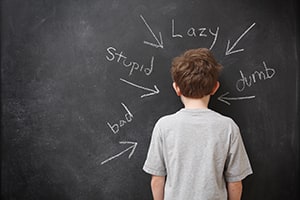Kids and Emotional / Psychological Abuse
 One of the most prevalent forms of child abuse is emotional/psychological abuse, in which a parent or caregiver engages in behavior, speech and actions that have a negative impact on a child’s wellbeing and development. Officially, the United States considers emotional abuse to be a “a pattern of behavior that impairs a child’s emotional development or sense of self-worth.” While this type of abuse may not leave the same injuries and scars as physical abuse, emotional abuse can be devastating to a child’s development and lead to lifelong problems that persist into adulthood. Emotional abuse is considered one of the most underreported forms of child abuse.
One of the most prevalent forms of child abuse is emotional/psychological abuse, in which a parent or caregiver engages in behavior, speech and actions that have a negative impact on a child’s wellbeing and development. Officially, the United States considers emotional abuse to be a “a pattern of behavior that impairs a child’s emotional development or sense of self-worth.” While this type of abuse may not leave the same injuries and scars as physical abuse, emotional abuse can be devastating to a child’s development and lead to lifelong problems that persist into adulthood. Emotional abuse is considered one of the most underreported forms of child abuse.
Emotional abuse may include insulting a child or engaging in persistent name-calling, threatening violence towards a child even where the threat is not carried out, allowing children to witness emotional abuse of others and allowing children to use drugs and alcohol. Emotional abuse can also include indifference to a child’s needs, humiliation of the child when he or she fails at a task, denigrating the child and neglecting the child.
Emotional abuse can be present in all categories of families, however it is statistically most likely to occur in families that are suffering from financial difficulties, single-parent households, families that are going through a divorce and families in which there are substance abuse issues.
Even great parents will occasionally yell at their children or become angry in times of stress. However, when this type of behavior is consistent a child can suffer the long-term effects of emotional child abuse.
There are six recognized types of emotional abuse, including:
Rejecting – Communicating to a child through words and conduct that he or she is unwanted and/or worthless.
Ignoring – Withholding affection or showing little or no interest in a child.
Threatening – Using threats, cursing and yelling at children.
Isolating – Prohibiting a child from engaging in appropriate activities with friends or keeping a child away from human contact.
Corrupting – Exposing a child to drugs, alcohol, criminal behavior or inappropriate sexual conduct.
Exploiting – Manipulating a child into a forced activity or responsibility without regard for the child’s development.
Recent studies by the American Psychological Association have found that the effects of emotional abuse can be severe on a child’s health and development. In fact, the APA has concluded that children who suffer emotional abuse and neglect can sometimes have more severe mental health issues than children who suffer physical or sexual abuse.
Children who experience chronic emotional abuse can suffer from anxiety, depression, low self-esteem, PTSD and suicide. Childhood emotional abuse is strongly correlated with depression, anxiety disorders, attachment problems and substance abuse. When physical or sexual abuse is accompanied by emotional abuse, the effects on the child can be significantly more severe.
Emotional abuse can also lead to an enhanced risk of health problems as an adult. A recent Purdue University study has linked childhood emotional abuse with a higher risk of developing cancer as an adult.
Legal Effects of Emotional AbuseUnlike physical or sexual abuse, emotional abuse of a child can be extremely difficult to establish definitively. A child who is emotionally abused may not have prominent bruises or broken bones but the effects can be just as devastating. Without clear-cut evidence of abuse, law enforcement and child protective services may be unable or unwilling to intervene in cases involving yelling or humiliating a child. However, where there are clear signs of neglect or where a child has been threatened with violence, law enforcement can take action and parents or other caregivers can be charged criminally.
Child protective services agencies may intervene and involve parents in educational programming or counseling to instruct about the impact of emotional abuse and to help change emotionally abusive behavior and habits. In many cases, emotional abuse may be a precursor to other forms of abuse and should be taken very seriously.
 Child Criminal Safety Center Home
Child Criminal Safety Center Home